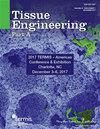Biofabricated adipose-derived mesenchymal cell sheets recover cryo-injured kidneys in rats.
引用次数: 0
Abstract
This study aimed to develop a treatment for chronic kidney disease (CKD) by investigating whether transplantation of biofabricated adipose-derived mesenchymal cell (AMC) sheets could improve renal tissue and function. Thirty-nine 10-week-old male Sprague-Dawley rats underwent the harvesting of adipose tissues and right nephrectomy. AMCs that were collected from adipose tissues were labeled and cultured on temperature-responsive dishes, and applied to a gelatin hydrogel sheet. Subsequently, two identical AMC-gelatin sheets were attached together to biofabricate a bilayered AMC-gelatin sheet. Further, 3 weeks after nephrectomy, the renal artery and vein of the left kidney were clamped, and the kidney was sprayed with liquid nitrogen for 60 seconds. The biofabricated AMC sheet was autologously transplanted into the renal capsule of the cryo-injured region (n = 14). Control rats were given acellular sheet (n = 25). One day before and four weeks after transplantation, blood and 24-hour urinary specimens were collected. Histological analysis of the experimental kidneys was performed four weeks after transplantation. Four weeks after transplantation, in the acellular control-transplanted rats, creatinine clearance levels tended to increase, while serum creatinine levels significantly increased. However, in the biofabricated AMC sheet-transplanted rats, creatinine clearance levels significantly increased, and serum creatinine levels remained unchanged and were significantly lower than that of the control rats. The ratio of damaged to undamaged renal tubules in the AMC sheet-transplanted rats was lower than that in the control rats. In addition, the occupancy rate of fibrotic areas in the renal cortex under the AMC sheet-transplanted regions was significantly lower than that in the control regions. After transplantation, while the expressions of transforming growth factor-beta 1 and hypoxia-inducible factor-1 alpha were observed in both the control- and AMC sheet-transplanted regions, these expressions tended to be lower in the AMC sheet-transplanted rats than in the control rats. The labeled transplanted AMCs were detected in the transplanted regions, with some of them also showing positive staining for the vascular endothelial growth factor antibody. In conclusion, the biofabricated AMC sheets improved renal functions by ameliorating renal tubule disorders and renal fibrosis. Therefore, biofabricated AMC sheets would serve as a potential treatment for CKD.生物制造的脂肪间充质细胞片可恢复大鼠冷冻损伤的肾脏。
本研究旨在通过研究移植生物制造的脂肪间充质细胞(AMC)片能否改善肾组织和肾功能,开发慢性肾病(CKD)的治疗方法。39 只 10 周大的雄性 Sprague-Dawley 大鼠接受了脂肪组织采集和右肾切除术。从脂肪组织中收集的AMC经标记后在温度反应皿中培养,并涂在明胶水凝胶片上。随后,将两个相同的 AMC-明胶薄片连接在一起,形成双层 AMC-明胶薄片。此外,在肾切除术 3 周后,夹住左肾的肾动脉和静脉,用液氮喷洒肾脏 60 秒。将生物制造的 AMC 片自体移植到低温损伤区域的肾囊(n = 14)。对照组大鼠使用无细胞薄片(n = 25)。移植前一天和移植后四周收集血液和 24 小时尿液标本。移植四周后对实验肾脏进行组织学分析。移植四周后,无细胞对照组移植大鼠的肌酐清除率水平趋于上升,而血清肌酐水平明显升高。然而,在生物制造的 AMC 片移植大鼠中,肌酐清除率水平明显升高,血清肌酐水平保持不变,且明显低于对照组大鼠。AMC 片移植大鼠受损肾小管与未受损肾小管之比低于对照组大鼠。此外,AMC片移植区肾皮质纤维化区域的占位率也明显低于对照区。移植后,虽然在对照组大鼠和AMC片移植区都观察到了转化生长因子-β1和缺氧诱导因子-1α的表达,但AMC片移植大鼠的这些表达往往低于对照组大鼠。在移植区域检测到标记的移植 AMC,其中一些还显示出血管内皮生长因子抗体的阳性染色。总之,生物制造的 AMC 片可改善肾小管功能紊乱和肾脏纤维化,从而改善肾功能。因此,生物制造的AMC薄片将成为治疗慢性肾脏病的一种潜在方法。
本文章由计算机程序翻译,如有差异,请以英文原文为准。
求助全文
约1分钟内获得全文
求助全文
来源期刊

Tissue Engineering Part A
CELL & TISSUE ENGINEERING-BIOTECHNOLOGY & APPLIED MICROBIOLOGY
自引率
0.00%
发文量
0
审稿时长
3 months
 求助内容:
求助内容: 应助结果提醒方式:
应助结果提醒方式:


